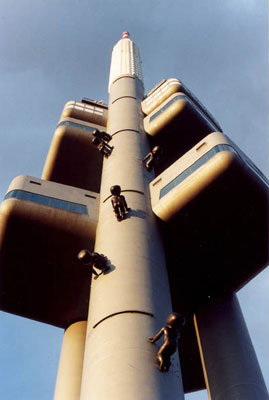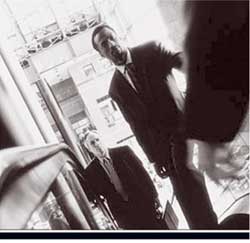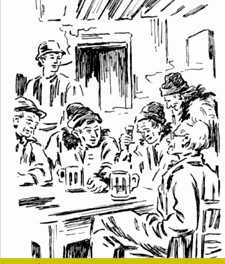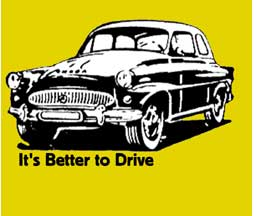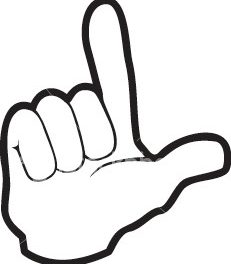It’s like a giant metal tree, this tallest structure in Prague, overlooking my flat at a corner where Vinohrady bleeds into Žižkov like where Main Street meets Tomorrowland at Disneyland.
It stands in an old Jewish cemetary. What remains of the cemetary is obscured by the public garage and the grassy square at the foot of the tower.
The two workers who were clearing debris down the path inside the cemetary were clearly disturbed by my presence as I peered through the metal fence surrounding the cemetary.
I ignored them and studied the antique headstones on the small rise, their identities rubbed smooth with time. When I noticed the freshly dug grave and the stack of headstones leaning against a tree nearby, the workers grew alarmed.
Even though the tower was finished in 1992, it appeared they were still removing bodies. One of the workers set down his shovel and started walking up the path toward me, heading for the small building at the end of the cemetary.
With friendly gestures, I tried to communicate my interest in finding a gate, but when he stopped the tone of his Czech made it clear that I was an unwelcome intruder. There were no gates for anyone.
I deferred with one last look at the shadowy headstones. Then, when I turned away and started walking back toward the tower, I looked up and saw the baby. A modern bronze, he seems to be crawling naked across the roof of the first level of look-out cabins, those metal box structures wedged between the three towers, the two short, the other enhanced by the long white corrugated section with the candy cane spire.
It had never occurred to me that if you lived on this side of the baby, you were left to look at his butt all day. The baby can be one thing during the day and another thing at night. I see him at a slight diagonal from the windows of my flat.
Only the suggestion of an ear is visible on his head, which is disproportionately large for his little body, the front of his face being a sunken box, as if somebody has whacked him in the face with a television set. Still, he seems alert, his head uplifted, as he gazes across the city from his perch.
I have an ongoing relationship with the baby. I don’t have much choice. He’s always there, crawling, night and day. When it gets dark, his belly and neck light up, heightening his abstraction. Various parts of the tower light up as the night goes on.
It was three in the morning the first time the baby signalled me. I was standing at the window looking for the moon. First, there was a jerky movement as if he was startled by something. His head darted toward the horizon. He knelt there fixed for a long time. Then he suddenly turned in my direction. He jumped to his feet and waved to me. I stood at the window and waved back.
The baby began a little dance. Then he leaned over with his hands on his hips and signalled for me to come see him in the tower. I had nothing better to do. I put on my coat and hurried down the five flights of stairs.
When I came to the corner and started across the street toward the tower, the baby was gone. Then all the lights in the tower went dark as a heavy storm cracked the air of Prague and rain poured down. Lightning splashed fire across the sky. The only lights lit in the tower were in the restaurant, its dim green lamps inviting.
I crossed the wooden walkway under the canopy. The lobby at the foot of the tower was lit and the doors to one of the elevators was open. They closed automatically once I stepped in and the lift shot up like a rocket, landing smoothly at the level of the restaurant. When the doors glided open, the baby was there to greet me.
“Welcome,” he telegraphed, and I knew I was in another dimension. He had a waiter’s towel draped over his arm.
“Dobry den,” I responded.
He led me across the dining room to a table by the window. It looked out on that side of Prague where lightning was washing the sky. He pulled out the chair and gestured for me to sit down. Then he handed me a menu.
“Take your time with the menu,” he said. “Everything’s ready.”
“Everything?” I asked.
“Everything you want is already prepared for you.”
I gave him a long even look and opened the menu. He went to the bar and opened a bottle of wine. When he returned, he set the glass on the table and filled it with red wine, the wine I usually have with dinner. He asked me if I was ready to order. The menu was Czech.
“I’ll have the lasagna,” I said.
“Salaty?” he inquired. I looked at the center of his indented face.
“Sure,” I whispered. He went off to the kitchen. I gazed out the window. I might have been flying across the city in a small airplane at this height, the expanse of the city so far below me. I looked through the rain beating against the windows just as another lightning bolt lit up Prague.
The gold embroidery across the facade of the National Theater shot massive sparks into the sky and the horses and chariots suddenly came to life, rearing upward. I began to wonder if it was the pot or the night.
You never know in Prague. The baby came back with the lasagna and salad. Then he took a chair across from me. I lifted my glass and toasted him with that firm eye-contact required by the Czechs.
“I’m not Czech,” he said.
I sipped the wine.
“Where are you from?”
“I’m from the future.”
“You’ve got a Czech accent.”
“It’s not me,” he replied. “It’s the way I’m wired.”
I tried the lasagna, blowing it cool. Had everything on the menu been ready, or did he know I would order the lasagna?
“Don’t you want to know about the future?” he asked. “Don’t you want to know about the figures looking down on Prague?” I had been thinking a lot about those creatures recently. I set down my fork.
“The angels and devils looking out from the columns?”
“The saints, the children, the crucified.”
“They look down from the windows and rooftops. They linger at the top of the stairs.”
“Of course you’ve seen the lowered-eyed maiden in the headdress.”
“She seems so still,” I said.
“It’s not stillness,” he said. “It’s acceptance.”
“Of the future?”
He sat back and tapped his little fingers on the table. “Your planet is armed for extinction.”
Another wash of lightning lit up the sky. I pushed the lasagna aside.
“You saw the mothership tonight,” I said.
He jerked the same way he did out on the roof. “You’re clever for an American,” he said.
“Are the figures waiting for the mothership?”
“They mean you no harm,” he assured me. “They’re benevolent spirits.”
“And you?”
“I’m one of them.”
I took a look sip of wine, looking at his box the whole time. “What do the figures have to say to us?” I asked him.
“They’re here to guide you through the future. You must accept it as gracefully as they do.”
“And you?”
“I’m afraid the mothership is coming closer for a reason.”
“It’s coming to take you away, isn’t it?”
“I don’t want to leave Prague. But the mothership knows when it’s time.”
He spoke in the same tone as the worker in the cemetary. I didn’t want to overstay my welcome. “It must be getting late,” I said as I got up from the table. “They’ll miss you out on the roof.”
“We’ve only been here a nanosecond,” he said.
It was already dawn outside the windows.
“Time slips away in Prague,” I said.
He walked me toward the elevator. “People feel it the most in Prague,” he said.
“The arrival of the mothership?”
He shook his head sadly. “Its departure.”
The doors to the elevator opened in front of me. I turned and shook his hand. “You must promise to come back for the calimari,” he said. “I’m much better with fish.”
“I’ll look forward to it,” I said.
“I’ll tell you some more about the figures.”
“I’ll keep an eye out for you.”
When I stepped onto the elevator, we both just stood there grinning at each other. “Prosim!” he chirped and stood on his toes as the elevator closed in front of me.

